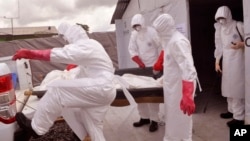The World Health Organization and Ebola-affected countries in West Africa have taken the first step in what promises to be a long process in strengthening health systems in these poor, fragile societies.
Health ministers from Liberia, Sierra Leone and Guinea, as well as representatives of major financial institutions, and international and private aid agencies are attending a high-level meeting on building resilient health systems.
The latest WHO figures show 17,942 confirmed Ebola cases in Guinea, Liberia and Sierra Leone, including 6,388 deaths.
During a WHO meeting in Geneva, the health ministers from the three Ebola-affected countries say weaknesses in their health systems led to the Ebola outbreak spiraling out of control. They also agree the laser-sharp focus on getting on top of the disease has led to the neglect of critical routine health needs.
Liberia’s Chief Medical Officer, Dr. Bernice Dahn, said this has created a general health crisis. She said pregnant women do not have access to health care, children are not getting immunized against diseases, people with hypertension have to fend for themselves. She said the death of many health workers from Ebola has resulted in some health facilities closing down.
Dahn attributes the deaths of more than 2,000 people from malaria between February and October to the lack of health services.
“If you look at the general deaths, it is over 6,000 -- and that is by far higher than the number of persons who have died from Ebola in my country. We believe we could have saved some of those deaths if our hospitals are open and functioning while we focus on getting rid of Ebola. And, so for my country, we decided to take a two-pronged approach -- continue to fight Ebola to get it to zero and revive routine health care services,” said Dahn.
Guinea, Liberia, and Sierra Leone are among the poorest countries in the world. All three have recently emerged from years of conflict with shattered health care systems. Even before Ebola struck, these countries were unprepared to deal with the normal demands of their populations.
WHO reports these countries only had one or two doctors for 100,000 people. Since Ebola, the situation has worsened as more than 600 health care workers have been infected with the virus.
Sierra Leone's Minister of Health and Sanitation Abu Bakarr Fofanah said in the absence of a functioning health system, a small, localized problem can rapidly become an epidemic or even a pandemic. He said it is crucial to strengthen these failing systems.
He said he welcomes discussion, but voiced reservations about the framework proposed by WHO for building a strong health facility
“If you look at it clearly, it is a wonderful model, but it works best under normal circumstances. But these are abnormal circumstances, so now we need to think outside the box and come up with those low-hanging fruits that we can quickly put in place, get rid of this epidemic and then we regroup and then match to the health systems properly," said Fofanah.
The World Health Organization suggests following a primary health care approach that brings services close to home, with community involvement.
It says the systems and resources currently being mobilized in the fight against Ebola should eventually be integrated into post-Ebola health infrastructure and services.














